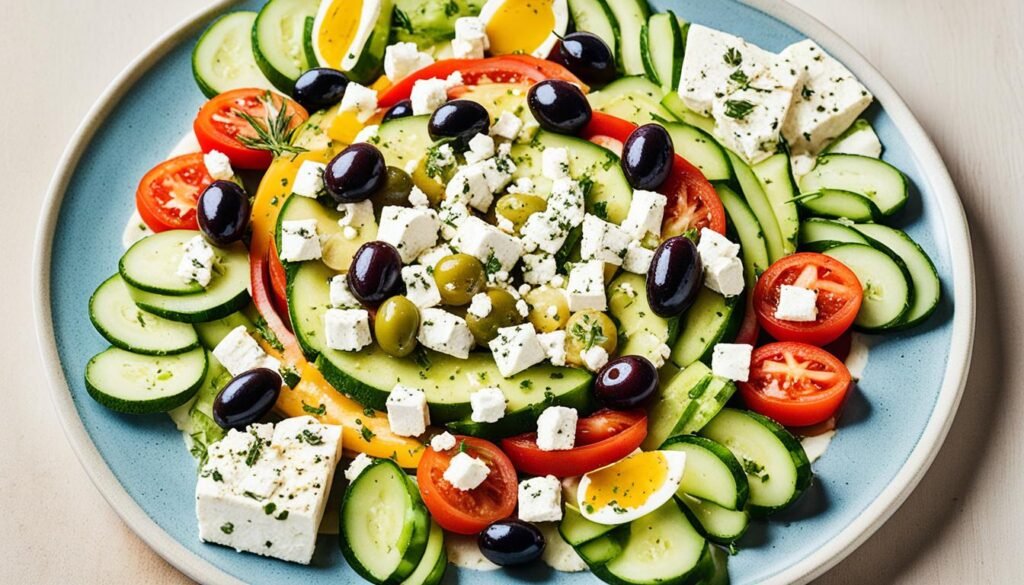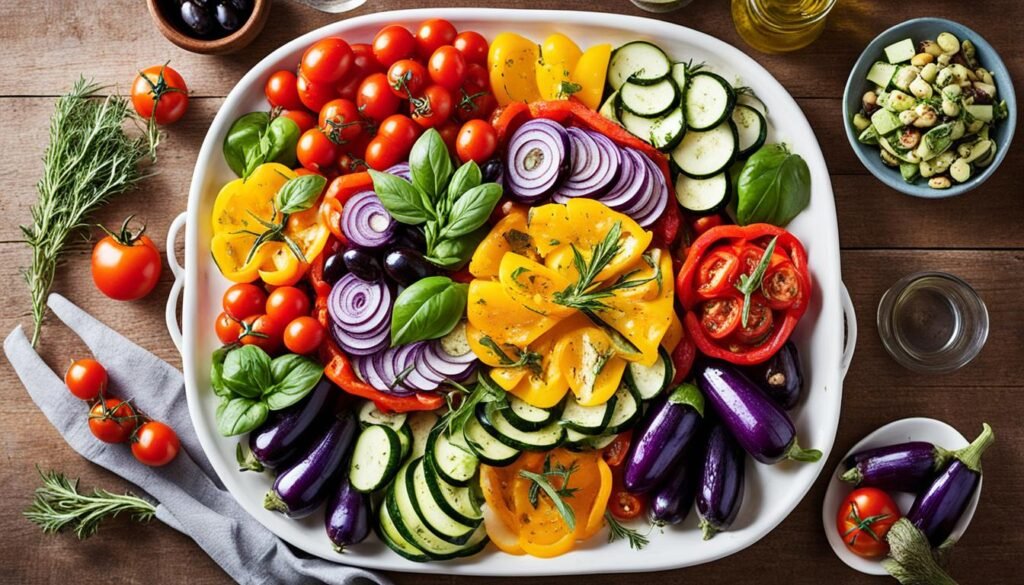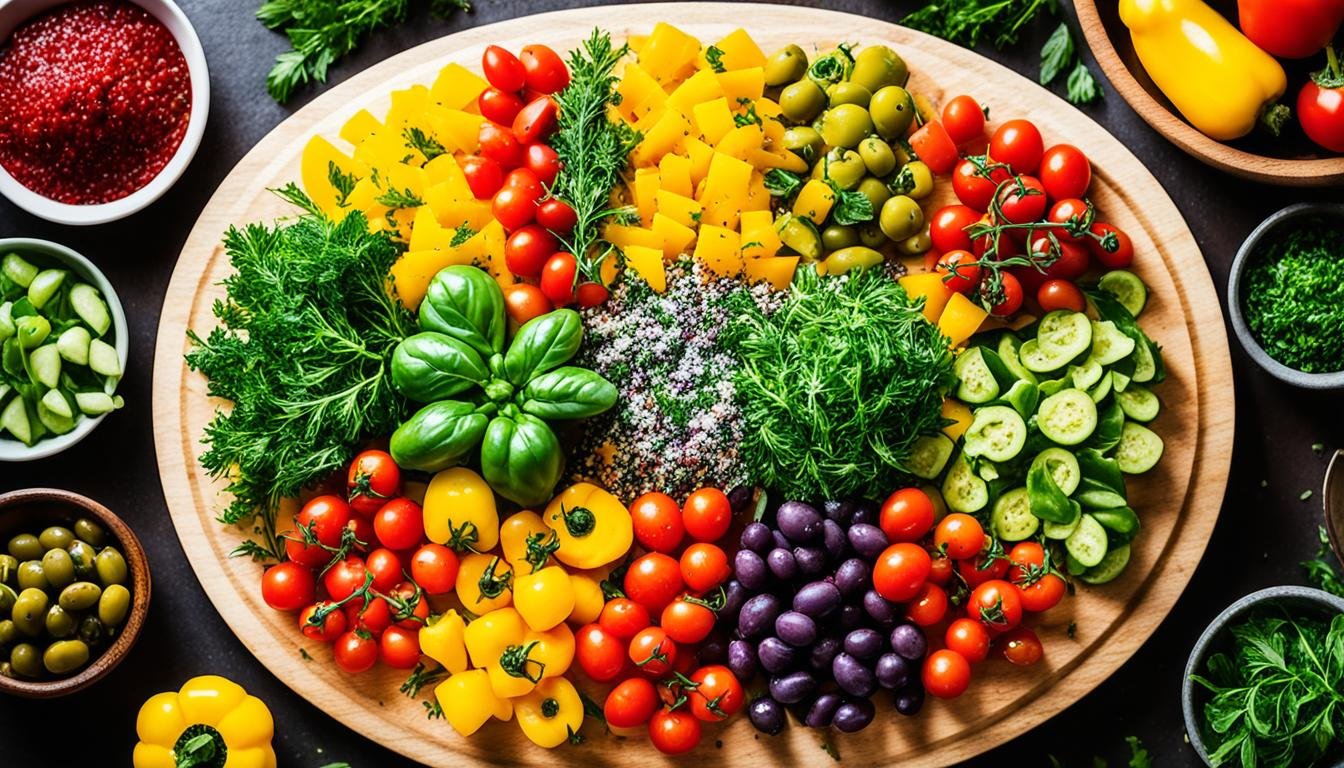As the sun set, it cast a warm glow over the olive groves and blue waters. I thought about the simple joys of the Mediterranean lifestyle. Growing up, I loved the homemade tomato sauces and family gatherings with fresh bread and local produce.
The Mediterranean diet is more than food; it’s a way of life. It’s about enjoying good food, being with loved ones, and loving nature.
If you want to try mediterranean diet recipes, healthy recipes, and mediterranean cuisine, you’re in the right spot. We’ll explore easy mediterranean meals, plant-based eating, olive oil recipes, and veggie-centric dishes. These 10 recipes are perfect for both seasoned cooks and beginners. They’ll take you to the sunny shores of the Mediterranean with every bite.
Key Takeaways
- The Mediterranean diet is a healthy and sustainable eating pattern that emphasizes fresh, whole foods.
- These 10 easy recipes showcase the vibrant flavors and nutritional benefits of Mediterranean cuisine.
- The Mediterranean lifestyle celebrates the joy of good food, community, and a deep appreciation for the natural world.
- Recipes include plant-based, olive oil-based, and seafood dishes that are perfect for beginners.
- Adopting a Mediterranean-inspired diet can lead to a more fulfilling and nourishing way of life.
What is the Mediterranean Diet?
The Mediterranean diet comes from the traditional foods of countries near the Mediterranean Sea. This includes Italy, Greece, and Spain. It focuses on whole, minimally processed foods. These foods are full of nutrients and offer many health benefits.
Understanding the Principles
The Mediterranean diet has some key principles:
- It includes lots of fruits, vegetables, whole grains, legumes, nuts, and seeds.
- It has moderate amounts of lean proteins, mainly from fish and seafood.
- It limits red meat and processed foods.
- It uses healthy fats like extra-virgin olive oil as the main fat source.
- It encourages drinking water and moderate amounts of red wine.
Benefits of a Mediterranean Lifestyle
Many studies show the Mediterranean diet is great for health. It can lower the risk of chronic diseases. These include:
- Heart disease: It’s linked to fewer heart attacks, strokes, and other heart problems.
- Type 2 diabetes: It can make insulin work better and lower the chance of getting type 2 diabetes.
- Certain types of cancer: Its antioxidants and anti-inflammatory effects may protect against breast and colorectal cancer.
- Cognitive function: It’s connected to better brain function and a lower risk of Alzheimer’s disease.
The Mediterranean lifestyle also values physical activity, social connections, and mindful eating and living.

“The Mediterranean diet is not just about the food, it’s a way of life that promotes overall well-being and longevity.”
Mediterranean Diet Recipes for Vibrant Veggies
The Mediterranean diet is famous for its focus on eating plants. Vegetables are key to this tasty way of eating. You’ll find recipes for roasted veggies, fresh salads, and main dishes that highlight vegetables. These recipes will help you add more seasonal produce and Mediterranean tastes to your meals.
These vegetable-based recipes bring out the bright colors and strong tastes of the Mediterranean. They’re great whether you’re an experienced cook or new to the Mediterranean diet. These dishes will make you feel full of energy and happiness.
Roasted Vegetable Medley with Olive Oil and Herbs
Use a mix of seasonal veggies like zucchini, bell peppers, and eggplant. Add olive oil, garlic, and Mediterranean herbs. Roast until they’re soft and golden. Finish with lemon juice and parsley.
Mediterranean Quinoa Salad with Cucumber and Tomato
Mix cooked quinoa with cucumber, cherry tomatoes, feta cheese, and a dressing of olive oil, lemon juice, and herbs. This salad is light and healthy. It’s perfect for a quick lunch or a side dish for a Mediterranean-style dinner.
Baked Stuffed Portobello Mushrooms
Take out the insides of big portobello mushrooms and fill them with a mix of sautéed spinach, garlic, and breadcrumbs. Add mozzarella cheese on top and bake until the mushrooms are soft and the cheese is melted.
| Recipe | Prep Time | Cook Time | Servings |
|---|---|---|---|
| Roasted Vegetable Medley | 15 minutes | 30 minutes | 4 |
| Mediterranean Quinoa Salad | 20 minutes | 15 minutes | 6 |
| Baked Stuffed Portobello Mushrooms | 25 minutes | 20 minutes | 4 |
Enjoy the bright colors and strong tastes of the Mediterranean with these great vegetable-based meals. These dishes are perfect whether you’re an expert cook or new to the Mediterranean diet. They’ll make you feel happy and full of energy.

“Vegetables are the foundation of the Mediterranean diet, and these recipes showcase the vibrant flavors and nutritional benefits of this plant-based cuisine.”
Wholesome Whole Grains
The Mediterranean diet is famous for its focus on whole grains. These grains give you complex carbs, fiber, and lots of important nutrients. Adding different whole grains to your meals boosts the nutrition of your Mediterranean-style dishes.
Nutrient-Rich Alternatives
Whole wheat, brown rice, quinoa, and farro are great whole grains for a Mediterranean diet. They are full of health benefits, like helping your digestion and heart.
Quinoa is a key whole grain in the Mediterranean diet. It’s a complete protein, meaning it has all the amino acids we need. Quinoa is also full of fiber, minerals, and antioxidants, making it very nutritious.
Farro is another favorite in the Mediterranean diet. It has a nutty taste and is high in protein. You can use it in soups, salads, or as a base for grain bowls. It adds a tasty and nutritious element to your meals.
Adding whole wheat and brown rice to your Mediterranean diet is also a good idea. These grains are full of fiber, vitamins, and minerals. They are great for a balanced, nutritious diet.
By trying out different whole grains, you can make your Mediterranean diet more tasty and nutritious. From hearty quinoa to nutty farro, these grains will become kitchen essentials.
Lean Proteins and Seafood Delights
The Mediterranean diet is famous for its focus on lean proteins and seafood. These foods are key for getting important amino acids and are great for the heart. They make any meal taste amazing.
Seafood is a big part of the Mediterranean diet. You’ll find everything from flaky white fish to grilled salmon and sautéed shrimp. Seafood is packed with lean proteins and omega-3 fatty acids. These are good for your heart and brain.
Chicken and turkey are also big in the Mediterranean diet. They are lean proteins that fit into many dishes. You can grill chicken breast with veggies or make a chicken and legume stew. This diet helps keep you healthy and feeling good.
For those who prefer plant-based proteins, the Mediterranean diet has lots to offer. Legumes like lentils, chickpeas, and black beans are full of nutrients. They can be used in soups, salads, or even as a meat substitute in burgers or tacos.
“The Mediterranean diet is not just a way of eating, but a way of living. It’s about celebrating the natural bounty of the land and sea, and nourishing both the body and the soul.”
Healthy Fats: Olive Oil and Beyond
The Mediterranean diet is famous for its focus on healthy fats. Olive oil is a key player in this diet. It’s not just a staple but also essential in many dishes. But, the diet also values avocado, nuts, and seeds for their health benefits.
Incorporating Good Fats
Adding healthy fats to your meals is crucial in the Mediterranean diet. These fats can lower heart disease risk, reduce inflammation, and help with weight control. Here are ways to add good fats to your meals:
- Use olive oil for cooking. It adds flavor and nutrition to salads, roasted veggies, and baked goods.
- Add avocado to your dishes. You can slice it for sandwiches, mash it for dips, or blend it into smoothies.
- Snack on nuts and seeds like almonds, walnuts, or chia seeds. They’re tasty and packed with nutrients.
- Try Mediterranean flavors with ingredients like olives, tahini, or pesto. They’re full of healthy fats.
By using these healthy fats, you can enjoy Mediterranean flavors and support your health.
“Healthy fats are the foundation of the Mediterranean diet, providing essential nutrients and contributing to the diet’s many health benefits.”
Remember, finding the right balance with healthy fats is key. Experiment with different ingredients and cooking ways. This way, you can make tasty, healthy meals that follow the Mediterranean diet.
Flavorful Herbs and Spices
The vibrant flavors of the Mediterranean region shine through herbs and spices. Ingredients like oregano and cumin bring the taste of the Mediterranean to your table. By using a mix of herbs and spices, you can make your meals taste amazing.
Herbs like basil, rosemary, thyme, and parsley add unique flavors to many dishes. You can mix these herbs to create your own special tastes. Or, try traditional blends like za’atar and chermoula for a true Mediterranean flavor.
Spices like cinnamon, coriander, and paprika can also make your dishes stand out. They add depth and warmth, turning simple foods into something special. Exploring these spices can take your cooking to new heights.
FAQ
What is the Mediterranean diet?
The Mediterranean diet focuses on eating plant-based foods, whole grains, lean proteins, and healthy fats. It’s based on the eating habits of countries around the Mediterranean Sea. These places are known for their long life spans and low rates of chronic diseases.
What are the key principles of the Mediterranean diet?
The Mediterranean diet’s main principles are:
– Eating lots of plant-based foods like veggies, fruits, grains, legumes, nuts, and seeds.
– Using healthy fats, especially olive oil, as the main fat source.
– Eating moderate amounts of seafood, poultry, and dairy.
– Eating less red meat and processed foods.
– Living an active life and staying connected with others.
What are the health benefits of following the Mediterranean diet?
Eating the Mediterranean way can lead to many health benefits. These include:
– Lower risk of heart disease, stroke, and type 2 diabetes.
– Better blood pressure and cholesterol levels.
– Improved brain health and thinking skills.
– Less chance of some cancers.
– Helping with weight management.
What are some easy Mediterranean diet recipes for beginners?
Easy Mediterranean diet recipes for beginners include:
– Roasted Vegetable Medley with Lemon-Garlic Dressing
– Mediterranean Quinoa Salad with Feta and Olives
– Baked Salmon with Herb-Crusted Topping
– Mediterranean Chicken Skewers with Tzatziki Sauce
– Whole Wheat Pasta with Tomato, Basil, and Olive Oil
How can I incorporate more vegetables into my Mediterranean-style meals?
To add more veggies to your meals, try:
– Roasting seasonal veggies with olive oil, herbs, and spices.
– Making colorful salads with greens, tomatoes, cucumbers, and other fresh produce.
– Sautéing or steaming veggies as a side dish.
– Blending veggies into soups, stews, or sauces.
What are some nutrient-rich whole grain alternatives in Mediterranean cooking?
Nutrient-rich whole grains in Mediterranean cooking include:
– Whole wheat pasta or bread
– Brown rice
– Quinoa
– Farro
– Bulgur
– Barley
These grains offer complex carbs, fiber, and important vitamins and minerals.
How can I incorporate more healthy fats into my Mediterranean-inspired meals?
To add more healthy fats, try:
– Using extra-virgin olive oil for cooking, dressings, and marinades.
– Adding avocado to salads, sandwiches, or as a side.
– Sprinkling nuts and seeds like almonds, walnuts, or chia seeds on meals.
– Including fatty fish like salmon, mackerel, or sardines in your diet.
– Using dips and spreads made with olive oil or tahini.
What are some flavorful herbs and spices commonly used in Mediterranean cooking?
Mediterranean cooking often uses herbs and spices like:
– Basil
– Oregano
– Rosemary
– Thyme
– Garlic
– Parsley
– Cumin
– Cinnamon
– Paprika
– Lemon and/or orange zest
These add depth and vibrant flavors to Mediterranean dishes.

